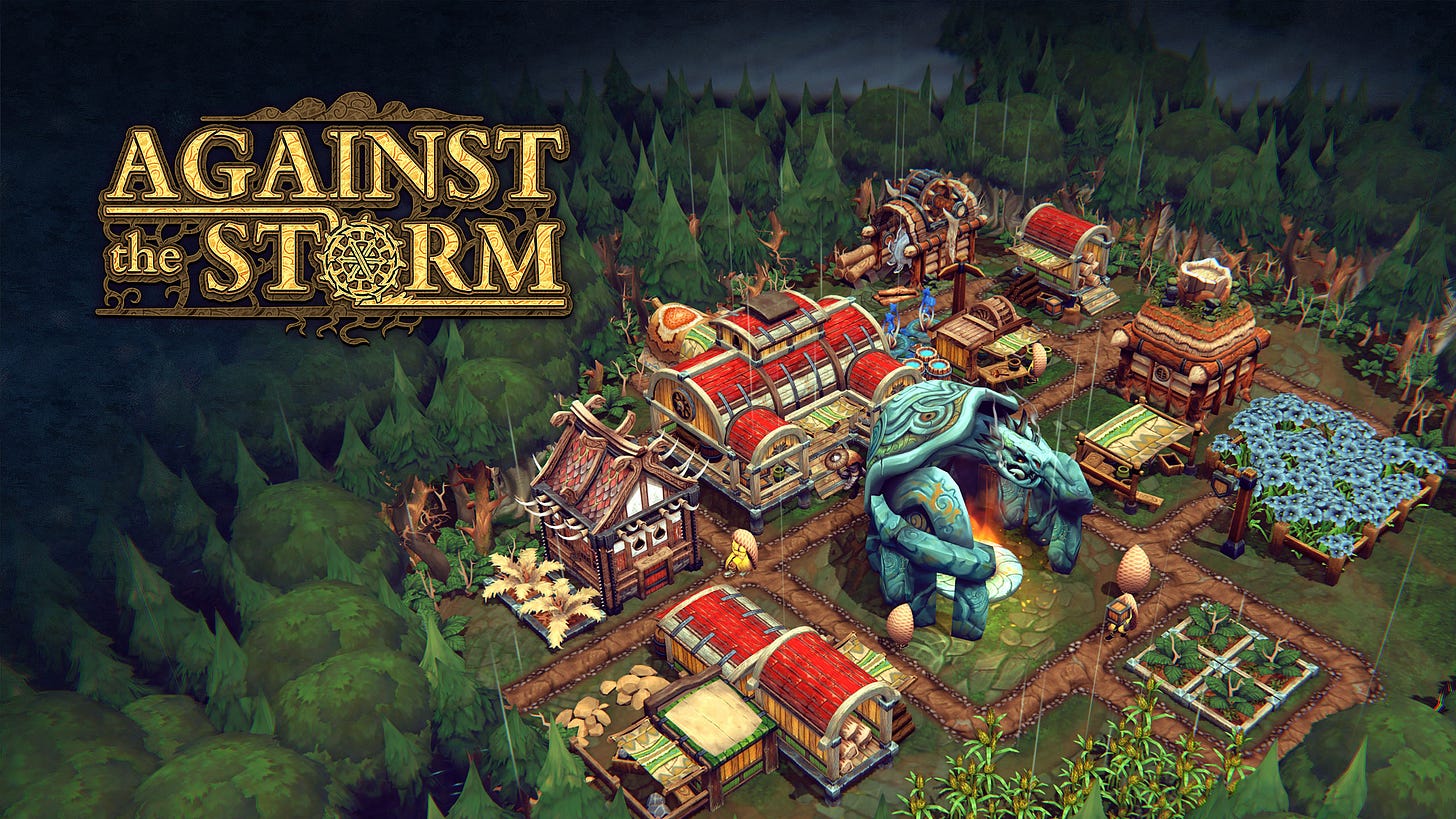Weathering the Storm
on falling trees, rainpunk beavers, trauma, and my current favorite game

It’s atmospheric river season in California right now. Compared to other places I’ve lived, Palo Alto doesn’t really feel like it has proper seasons. Nature will sort of gesture toward seasonality — one tree in my yard will turn red in November, and daffodils pop up in March — but you can wear pretty much the same clothes year-round if you want to. Even during the so-called “rainy season,” it doesn’t rain often. It’s only called that because it might rain, whereas in the dry season it definitely will not. Most of the rainfall comes from a handful of huge, heavy storms.
My kids are always delighted when it rains, because it means video games now and puddles later. They have an easy time accessing gratitude that the plants are getting the water they need. But recently, when the storms come — especially when heavy winds break the branches off trees — I’ve been struggling to hold myself together.
It started about a year ago. I was sitting in my office, trying to prepare myself as best I could for a call with Anna Sproul-Latimer, who I very much hoped would want to take me on as a client. Early signs were hopeful — she’d responded to my cold email (!), which was already huge, and asked to see my manuscript (!!). Although, of course, the minute I hit send, I started to panic. I texted my partner, is it too late to go back and have written a better book? After a moment he responded, like an asshole who really gets me, is that enough? you might have to go back and live a better life. That’s the fun of having memoir as your genre.
And now it was several days later, and we were about to talk. I was sitting in the purple loveseat in my office, staring out at the 100-year-old oak tree in my yard. The tree was so massive that the view from my office felt almost like being in a treehouse. When I was puzzling through something, I liked to look out at it and remember that it was almost an entire ecosystem in itself. There were always several squirrels running up its trunk, and crows and sparrows in its branches, along with termites and ants and yellow jackets and spiders. I think there was a hummingbird nest in there too, because there were usually a couple of them flitting around. It was raining that morning, and the tree swayed dramatically in the wind. And then it began to tip over. Its branches scraped against my office window and the shingles on the side of my house, and then it fell toward the street and crashed into my yard.
For a few seconds I was too stunned to even process what I’d just seen. And then I ran downstairs. I was terrified that my dog was in my yard and had gotten hurt, but fortunately she was still out on a walk. The tree’s massive trunk and branches now took up most of my yard, blocking the entire front of my house, but we’d been lucky. The only damage to the house itself was that scratched window, and while my fence was toast, the tree had fallen right in front of my car, blanketing it in leaves and twigs but leaving it completely unscathed. As I surveyed the situation, a hummingbird landed on what remained of my fence. It seemed to look out at the completely wrong and unnatural orientation of what had been its home. And then it flew away.
I composed myself. I made calls to my insurance, and to my gardener to find out how to get the tree removed. Dozens of trees fell in my neighborhood that day, so I learned that I might have to wait a little while. I took the call with Anna, although it was short-lived. Some of the tree’s branches must have been resting on the power line, and ten minutes into the call, it gave up. I heard a very loud popping sound and my power, internet, and cell service went completely dead. Apparently my face froze on Zoom, and Anna took a screenshot to immortalize my extremely dignified expression:
In the days after the tree fell, I focused on logistics. That was how things were with my divorce, too. When you’re in the thick of the problem-solving, you don’t even realize all of the subtle ways everything will look different after.
The house doesn’t feel the same now. My yard is too sunny and the view from my office window is much less interesting. I can see the Stanford campus in the distance now, but I preferred the tree. The light feels wrong. I miss the hummingbirds.
A week or so after the tree fell, there was another windy rainstorm, and I started to panic. As I watched the neighbors’ trees sway, I felt my heart rate climb. All of the trees in their yards looked way too close to my house. Nowhere felt safe. Eventually I climbed into my bathtub fully clothed, hugged my knees, and tried to breathe.
A year passed. And then, the first weekend in February, the winds and rain came again, and the old terror returned. My dog had been curled up at my feet on our couch in a shape I like to call a “dog croissant,” but as my breathing got shallower she reoriented herself to rest her chin on my knee. At 70+ pounds, she’s too heavy to have resting comfortably on my legs most of the time. But when I’m upset her weight feels good, and she seems to know that somehow.
Yung In Chae, one of my co-editors at Eidolon, once joked that my life was like a sitcom but with lazy writers. And because the writers are lazy, as the winds gusted, I was playing a game I’ve been obsessed with for the past few months called Against the Storm.
Against the Storm is a relatively new game. It is, somewhat improbably, a rainpunk roguelite settlement builder. (I already gushed about my love of roguelites in this newsletter on Hades, although the two games are very different.) Or, as the developer describes it:
A dark fantasy city builder where you must rebuild civilization in the face of apocalyptic rains. As the Queen’s Viceroy, lead humans, beavers, lizards, foxes, and harpies to reclaim the wilderness and secure a future for civilization's last survivors.
So it starts off much as a Sim City-type game might, with you plotting out roads and placing homes and gathering resources. Time in the game is measured in years, and each year is split up into three seasons: “drizzle” (Spring), “clearance” (Fall/harvest), and “storm” (apocalypse). You only spend a few years with each settlement before leaving it behind to start a new one. After a cycle of a dozen or so settlements, a heavier storm comes and wipes out the entire map, and you can start over again.
Each settlement starts in a large glade in the middle of a forest. You’ll need to chop down trees for wood to build more buildings and keep your hearth burning, and thinning the forest also allows you to access other glades that contain resources, events, and treasure chests. But as you cut down trees and open glades, the forest grows more and more hostile to you, and that makes your villagers anxious. One key resource to manage is your villagers’ “resolve” level — their happiness, basically. Every species wants raincoats for storm season and species-specific housing,1 but you can also make them happier by providing specific foods and services. Humans like biscuits and pie and leisure and religion, which seems about right. Lizards like meat products and brawling and enjoy working in warm buildings, like bakeries. You get the picture.
During the storm season, your villagers’ resolve plummets. If it goes into the negative — and trust me, it will — you can either try to raise it by any means possible or watch as a countdown starts. Citizen by citizen, harpies and foxes and lizards begin to leave your settlement. (Humans and beavers are a little hardier.) Events can kill your villagers, too. If too many leave or die, you might not have enough left to gather resources and produce goods, and you may need to abandon the settlement altogether.

I’m not sure exactly what makes this game as fun as it is. It’s partly the satisfaction of laying out a well-planned city. The regular rhythm of chill seasons spent building and collecting resources alternating with scrambling to keep your head above water (so to speak) during the storm keeps things exciting, if somewhat stressful. And it’s just got a really cool aesthetic, charming and creepy at the same time.

Is it a little on the nose that I was playing this specific game while trying to fend off a panic attack during the latest atmospheric river? Sure, but sometimes in life the writers are just lazy. Sometimes when the storm rages outside it feels impossible that you’ll ever feel safe and content again.
My five-year-old son likes to snuggle up to me on the couch and watch me play, even though it’s not a particularly action-packed game. He worries that my woodcutters are chopping down too many trees and making the forest angry, which is fair.
In the game, when one of your little beavers cuts down a tree, it starts to wobble, then falls, but disappears before it hits the ground and becomes a stack of wood in your villager’s inventory. Much easier and simpler than real life, where it takes three men with chainsaws several days to unmake what it took nature over a hundred years to grow.
In spite of his concern about the forest’s hostility, my son does often urge me to open more glades to see what’s inside. Glade events typically offer you two different options, requiring different resources and the temporary assumption of different risks. If there’s a decision with an option of the “empathy” type, my son always, always wants me to take it. If there’s a huge, horrifying mole with Wolverine hands, he wants me to feed it and “make it happy” instead of chasing it off. He wants me to choose the option to be kind whenever I can. There’s a lesson in that, I’m sure.

He still tells me, often, that he misses our tree. We grieve it together. I’m glad that I can share the loss with him, and maybe even gladder that he doesn’t seem to share my fear of the wind. The way I now look at the neighbors’ oak trees with suspicion, wondering if the downpour has softened the soil around their roots too much. The native redwoods are much better equipped to whip back and forth with the wind instead of falling over. There’s a lesson in that too, and not a subtle one.
According to the forecasts, there’s another atmospheric river headed our way next weekend. I’m worried, but at least I have some time to prepare. Since I’m human, my plan is to keep my resolve up using coats, baked goods, a house with other humans, and leisure.
This is literally the only part of the game that feels a little ick to me, because it sort of smacks of segregation? But trying to balance the different food and service preferences of the different species is sort of the heart of the game, so I get it, just like I get the choice Supergiant made to tank Persephone and Demeter’s relationship in Hades. Sigh.




